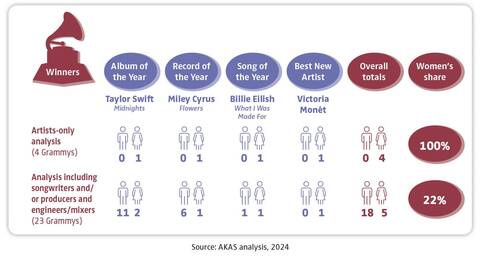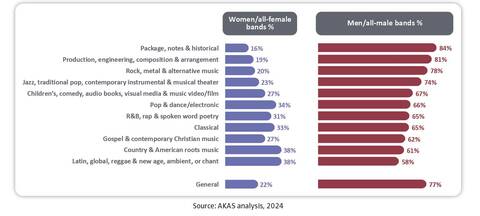You are here
Do Women Really Dominate the GRAMMYs? Study Reveals a Different Reality
According to the research, only 28% of the 2025 GRAMMY nominees are women
The myth of female domination and the harsh backstage reality
The GRAMMY Awards are often seen as the highest recognition in the music industry, celebrating talent across all genres and styles. However, a new study by consultancy AKAS, titled Missing Voices of Women in Music and Music News, reveals a reality vastly different from what mainstream media portrays. Despite headlines frequently exalting a supposed “female domination” at the awards, data shows that women are still far from parity at the GRAMMYs.
The numbers behind the inequality
According to the research, only 28% of the 2025 GRAMMY nominees are women. Men account for 69% of the nominations, and female participation in the “Big Four” categories—Album of the Year, Record of the Year, Song of the Year, and Best New Artist—is only 20%.
The study also shows that between 2017 and 2024, only one in five awards and nominations went to women. In 2024, they won 32% of the awards, an improvement from 12% in 2017, yet still insufficient compared to male dominance in the event. The music industry, largely controlled by male producers, engineers, and songwriters, continues to shape women's chances of being recognized at the GRAMMYs.
Gender analysis of the 2024 Grammy winners of the big four awards:
The media’s role: A false feminine triumph?
Despite clear inequality, the media has promoted the narrative that women are “dominating” the GRAMMYs. In 2024, about 24% of headlines covering women at the awards used terms like “dominate” and “rule,” masking the reality of the numbers.
The AKAS analysis shows that while stars like Taylor Swift, Billie Eilish, and Miley Cyrus are constantly celebrated, most nominees and winners behind the scenes—songwriters, sound engineers, and producers—are still men. For instance, in the 2024 edition, the four main categories were won by female artists, but only 22% of the awards in these categories actually went to women, as the primary songwriters and producers behind these victories were men.
Read this next: Women Have Had Their ‘Lives Ruined And Careers Destroyed’ Due To Issues Still Plaguing The Music Sector
Structural barriers and the culture of exclusion
The study also explores the challenges women face in the industry, including gender discrimination, sexual harassment, wage inequality, and lack of access to leadership positions.
In some categories, female presence is nearly nonexistent. Between 2017 and 2024, women did not win awards in categories like “Producer of the Year, Non-Classical,” “Best Improvised Jazz Solo,” and “Best Orchestral Performance.” This highlights a gender-segregated industry that prevents women from having equal opportunities across all music sectors.
Gender breakdown of nominations within each new Grammy field and General in 2025, in descending order of male nominations:
The path forward
The AKAS study proposes solutions for greater transparency and fairness in the awards:
The Recording Academy should open its database to allow a complete analysis of gender representation across all categories.
The music press should take a more investigative approach, questioning the Academy about true female representation rather than simply reproducing official press releases.
Increasing female representation among voting members of the Academy is essential to ensure a more inclusive perspective on nominations and victories.
Read this next: When The Music Ends: Short Film Unveils Sexual Harassment In Electronic Music Scene
Conclusion
While progress has been made, it is evident that there is still a long way to go for women to achieve fair representation at the GRAMMYs and in the music industry as a whole. To attain true equality, it is crucial to break the structural barriers limiting female opportunities. As long as the media continues to paint a distorted reality, the fight for gender equity will remain an ongoing challenge.
You can read the full report here.


